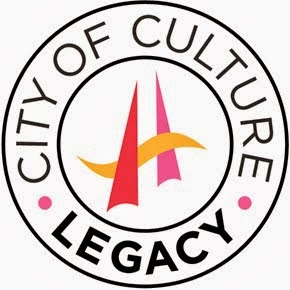The Playhouse's Theatre Of Witness programme premieres plays on mixed marriages and survivors in Derry-Londonderry
The Theatre Of Witness mentoring programme, set up by Derry-Londonderry's Playhouse Theatre in 2009, has established itself as a means of expressing true, unheard stories through the mouths and motions of those who experienced them, so that audiences may see and hear those experiences. Hence, "Theatre Of Witness"; the people are acting and the audience are reacting as they witness genuine expression and emotionalism from both sides of a theatre.
And that is why the premieres of Unspoken Love and Our Lives Without You arguably stand head and shoulders above any of the numerous fine productions that have been performed in this house of plays; in the strictest sense of the word, they are not plays. In relaying real life to onlookers of all sorts through the medium of theatre, they transcend what traditional plays can offer. They provide the sort of double whammy that leaves an indelible mark on one's soul; two couples, five women and a man recount stories and relive experiences to an extent in which their pain cannot possibly be imagined. They are not naturalistic, they are natural; a genuine tour de force.
To Tom Spiers, the director of Unspoken Love, "love" is remote; that is, until we experience it ourselves or see its kindness, generosity and courage in the lives of others. For that, we turn to two mixed marriage couples; Roley & Jo McIntyre and Stephen & Sharon Gault. The quartet of two Protestant men and two Catholic women walk onto centre stage in loving synchronicity, immediately establishing a strong emotional bond with the watchers. It is the ideal set-up for an intimately authentic reflection on love and marriage.
Now, it is bad enough finding out that you're up for adoption – an unwanted child – but, to be in the same pages as adverts for chickens, cars and washing machines? To be no more than a "classified"? Such is the woeful revelation by which the Protestant Roley opens a tale of his childhood, years tarred with physical and emotional abuse. His eventually loving existence was tempered by a violent atmosphere and school bullies. From this humiliation, degradation and shame, his pride was lost – but he gained a vitality that remains with him to this day. It's the old adage of "what doesn't kill you makes you stronger", illustrated tenderly.
As is the story of how he won over the Catholic Jo. We laugh at how the buying of cigarettes was enough to charm her, but we are hurt by the violent death threats he received for crossing the sectarian barricade. It pains us to be reminded that the very "honesty, compassion and truth" that Roley seeks to live by from Sunday School lessons can be flushed away by people who turn on you.
Jo's situation, we hear, is no less gruelling; her courtship of the likable Roley ruffled feathers of both friends and father for purely religious reasons. When Jo's mother died on a Valentine's Day, cruelly cutting short a special bond, Jo thought she'd never receive a valentine again; until she formed a new special bond with Roley. Which, of course, Jo's dear old Dad did not take kindly to.
But how frosty relations can thaw in the right circumstances with the right people. It becomes clear that it's not a matter of merely religion, but also the thought of losing his baby girl to another man that affects a father. And Jo's father never shunned Roley; eventually, the younger man found himself caring for his sick father-in-law, creating a further special bond that neither thought could or would develop. It is heart warming to know that such coldness can be enveloped by warmth, and to feel that love can indeed conquer all.
The well-mannered and quietly moving recollections of Roley and Jo couldn't appear more different from the alternately dreamy and heavily active memories of Sharon and Steven. Sharon, it would appear, was forced into living a dream in her childhood because her dad is an alcoholic; in her words, he could not love her like he loved the drink. It is what split her parents up and left her lamenting a nuclear family that would never exist unless she created one for herself.
It is, as Stephen King would say, the hope that eventually set her free from this prison; and here her recollections take a dryly amusing turn. She fondly recalls how Stephen never quite got "the hint" while she worked at a waitress at his golf club, how one plan to get his attention failed and how the second plan succeeded . While her father created a metaphorical wall of glass bottles to shut out his problems, Stephen returned the handbag Sharon intentionally left behind, crossing his own wall and creating inseparable love between the two.
Alas, Stephen is facing another barrier which Sharon can do nothing about. Recounting the loss of his own father on Remembrance Sunday, 1987, he recalls seeing sights that no eighteen-year-old should see. He remembers his mother telling him not to avenge his father's death. Silent tears, unhealed wounds and nightmarish visions built up into a painful ball of fear that turned him into a recluse; the story of meeting "the girl who knows what he likes", Sharon, is the release he needed then and the relief that he and we need now.
The real obstacle to their happiness, unfortunately, is not religion – Catholics happened to be best friends to the Protestant Stephen – but the arthritis that struck him down six months into their marriage. And you can see the lines on Sharon's face; this, along with the present-day knowledge that she has surrendered her life to become his carer, is the play at its most hard-hitting. The unspoken love lives of Sharon & Steven, and Roley & Jo before them, have cemented themselves in our hearts and minds.
Far more harrowing matters envelop the hearts and minds of the larger ensemble of Our Lives Without You, directed by Alessia Cartoni. Each of six individuals, one man and five women, places a pair of shoes at the front of the stage to mark a lost loved one in the Ballymurphy Massacres of August 1971. For more than two decades, these Ballymurphy family members, emotional victims of Belfast's "Bloody Sunday" have been campaigning for justice, and have worked for four months with director Cartoni to embrace their stories and bring the truth to the surface. Our Lives Without You sees both the performers and the audience reap the fruits of the labours.
Eileen Corr is the first to step forward, and recalls her nine-year-old self being too numb to cry at the murder of her father, Joseph Corr. For years she believed that soldiers simply mistook her father's lunchbox for a gun. What, she and we, ponder, is the difference between reality and fantasy for a nine-year-old? Later, stung by the injustice of it all, she blanked everything out and lost her pride, but has recovered to establish herself as the determined voice she must be for her father. The voice she believes will clear his name.
An brief interlude featuring singing and hopscotch, presumably there for much needed bonding and freedom from loneliness, precedes the memories of Pat Quinn. Pat is suffering the burden of losing his older brother Frank in the massacres, and appears to be dealing with Frank's death through resigned mourning. He longs to break free from the terrible memories that have shaped his own life. "The way we remember everything; this is how we see things", he says.
Both Rita Bonner and Briege Voyle are initially subsumed by every negative effect on the emotional spectrum. It is particularly painful for both women, who still live in Belfast, to recall how the murders of Rita's brother (John Laverty) and Briege's mother (Joan Connolly), respectively, irreparably destroyed their hitherto youthfully idealistic views. It is harder still for Alice Teggart, whose great niece Aisling Devlin, representing the "next generation" to whom these stories must be passed, recounts the story of her dead father (Danny Teggart) for her great aunt.
As everyone bids goodbye to their loved ones in their narratives, the stories interlock, and offstage sound and music become prominent. The draw of Our Lives Without You rests in expression and thematic depth; the power inherent in the production escalates when the performers delve into the insensitivity and cruelty of the time, where our undoubted heroes were forced to fend for themselves.
We are inspired by Aisling's recollections of Alice's re-invention of herself as a matriarch, we shiver at the void the British army have left in Pat's life, and we shudder at what the massacre and its aftermath have done to the lives of Rita and her family. But perhaps most emotionally effective of all is Briege's confrontation with her deepest, darkest memories. This woman, who recalls running away once her mother died as a coping mechanism, softens and strengthens as she details the resolve that developed when she lost her father and became a mother and grandmother. A brush with cancer completed her transformation into a "woman (she) never thought (she) would be". Once upon a time, she would have been happy to join her mother up in heaven; but did she really want to leave her children to die spiritually inside, like she once did?
Our Lives Without You closes on a very sombre note, with the victims lighting candles, scattering rose petals and examining the shoes of their lost loved. One cannot even begin to comprehend just how hard it must have been for each individual on stage to recount their experiences to us. Everyone and everything we have seen on the night should not fade from memory.
















0 comments:
Post a Comment